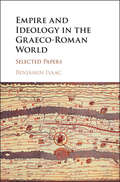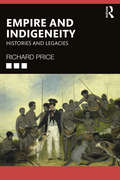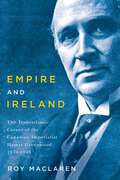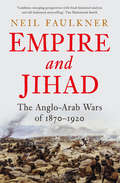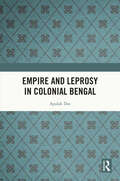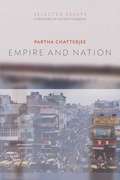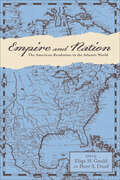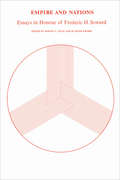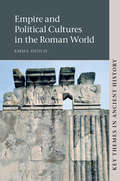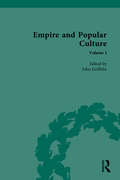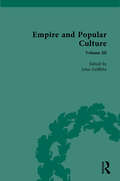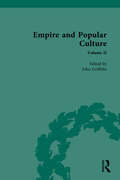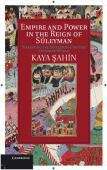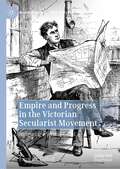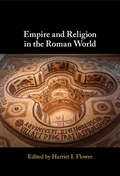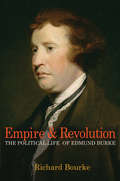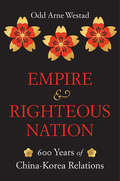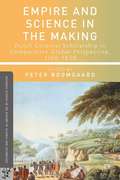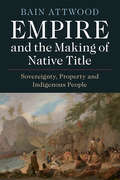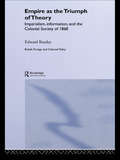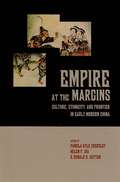- Table View
- List View
Empire and Ideology in the Graeco-Roman World: Selected Papers
by Benjamin IsaacBenjamin Isaac is one of the most distinguished historians of the ancient world, with a number of landmark monographs to his name. This volume collects most of his published articles and book chapters of the last two decades, many of which are not easy to access, and republishes them for the first time along with some brand new chapters. The focus is on Roman concepts of state and empire and mechanisms of control and integration. Isaac also discusses ethnic and cultural relationships in the Roman Empire and the limits of tolerance and integration, as well as attitudes to foreigners and minorities, including Jews. The book will appeal to scholars and students of ancient, imperial, and military history, as well as to those interested in the ancient history of problems which still resonate in today's societies.
Empire and Indigeneity: Histories and Legacies
by Richard PriceIndigeneity is inseparable from empire, and the way empire responds to the Indigenous presence is a key historical factor in shaping the flow of imperial history. This book is about the consequences of the encounter in the early nineteenth century between the British imperial presence and the First Peoples of what were to become Australia and New Zealand. However, the shape of social relations between Indigenous peoples and the forces of empire does not remain constant over time. The book tracks how the creation of empire in this part of the world possessed long-lasting legacies both for the settler colonies that emerged and for the wider history of British imperial culture.
Empire and Ireland: The Transatlantic Career of the Canadian Imperialist Hamar Greenwood, 1870–1948
by Roy MacLarenHow the liberal imperialist Hamar Greenwood filled his controversial role as chief secretary for Ireland.
Empire and Jihad: The Anglo-Arab Wars of 1870-1920
by Neil FaulknerA panoramic, provocative account of the clash between British imperialism and Arab jihadism in Africa between 1870 and 1920 The Ottoman Sultan called for a "Great Jihad" against the Entente powers at the start of the First World War. He was building on half a century of conflict between British colonialism and the people of the Middle East and North Africa. Resistance to Western violence increasingly took the form of radical Islamic insurgency. Ranging from the forests of Central Africa to the deserts of Egypt, Sudan, and Somaliland, Neil Faulkner explores a fatal collision between two forms of oppression, one rooted in the ancient slave trade, the other in modern "coolie" capitalism. He reveals the complex interactions between anti-slavery humanitarianism, British hostility to embryonic Arab nationalism, "war on terror" moral panics, and Islamist revolt. Far from being an enduring remnant of the medieval past, or an essential expression of Muslim identity, Faulkner argues that "Holy War" was a reactionary response to the violence of modern imperialism.
Empire and Leprosy in Colonial Bengal
by Apalak DasLeprosy, widely mentioned in different religious texts and ancient scriptures, is the oldest scourge of humankind. Cases of leprosy continue to be found across the world as the most crucial health problem, especially in India and Brazil. There are a few maladies that eventually turn into social disquiets, and leprosy is undoubtedly one of them. This book traces the dynamics of the interface between colonial policy on leprosy and religion, science and society in Bengal from the mid-nineteenth to the first half of the twentieth centuries. It explores how the idea of ‘degeneration’ and the ‘desolates’ shaped the colonial legality of segregating ‘lepers’ in Indian society. The author also delves into the treatments of leprosy that were often transfigured from ‘original’ English texts, written by American or British medical professionals, into Bengali.Rich in archival resources, this book is an essential read for scholars and researchers of history, Indian history, public health, social history, medical humanities, medical history and colonial history.
Empire and Nation: Selected Essays
by Partha ChatterjeePartha Chatterjee is one of the world's greatest living theorists on the political, cultural, and intellectual history of nationalism. Beginning in the 1980s, his work, particularly within the context of India, has served as the foundation for subaltern studies, an area of scholarship he continues to develop. In this collection, English-speaking readers are finally able to experience the breadth and substance of Chatterjee's wide-ranging thought. His provocative essays examine the phenomenon of postcolonial democracy and establish the parameters for research in subaltern politics. They include an early engagement with agrarian politics and Chatterjee's brilliant book reviews and journalism. Selections include one never-before-published essay, "A Tribute to the Master," which considers through a mock retelling of an episode from the classic Sanskrit epic,The Mahabharata, a deep dilemma in the study of postcolonial history, and several Bengali essays, now translated into English for the first time. An introduction by Nivedita Menon adds necessary context and depth, critiquing Chatterjee's ideas and their influence on contemporary political thought.
Empire and Nation: Selected Essays
by Partha ChatterjeePartha Chatterjee is one of the world's greatest living theorists on the political, cultural, and intellectual history of nationalism. Beginning in the 1980s, his work, particularly within the context of India, has served as the foundation for subaltern studies, an area of scholarship he continues to develop. In this collection, English-speaking readers are finally able to experience the breadth and substance of Chatterjee's wide-ranging thought. His provocative essays examine the phenomenon of postcolonial democracy and establish the parameters for research in subaltern politics. They include an early engagement with agrarian politics and Chatterjee's brilliant book reviews and journalism. Selections include one never-before-published essay, "A Tribute to the Master," which considers through a mock retelling of an episode from the classic Sanskrit epic, The Mahabharata, a deep dilemma in the study of postcolonial history, and several Bengali essays, now translated into English for the first time. An introduction by Nivedita Menon adds necessary context and depth, critiquing Chatterjee's ideas and their influence on contemporary political thought.
Empire and Nation: The American Revolution in the Atlantic World (Anglo-America in the Transatlantic World)
by Eliga H. Gould and Peter S. OnufThe essays in Empire and Nation challenge facile assumptions about the "exceptional" character of the republic's founding moment, even as they invite readers to think anew about the complex ways in which the Revolution reshaped both American society and the Atlantic world.How did events and ideas from elsewhere in the British empire influence development in the thirteen American colonies? And what was the effect of the American Revolution on the wider Atlantic world? In Empire and Nation, leading historians reconsider the American Revolution as a transnational event, with many sources and momentous implications for Ireland, Africa, the West Indies, Canada, and Britain itself.The opening section of the book situates the origins of the American Revolution in the commercial, ethnic, and political ferment that characterized Britain's Atlantic empire at the close of the Seven Years' War. The empire experienced extraordinary changes, ranging from the first stirrings of nationalism in Ireland to the dramatic expansion of British rule in Canada, Africa, and India. The second part focuses on the rebellion of the thirteen colonies, touching on slavery and ethnicity, the changing nature of religious faith, and ideas about civil society and political organization. Finally, contributors examine the changes wrought by the American Revolution both within Britain's remaining imperial possessions and among the other states in the emerging "concert of Europe."
Empire and Nation: The American Revolution in the Atlantic World (Anglo-America in the Transatlantic World)
by Eliga H. Gould and Peter S. OnufA look at America’s revolution in the context of the larger British empire: “Many interesting essays . . . a valuable scholarly contribution.” —Journal of Colonialism and Colonial HistoryHow did events and ideas from elsewhere in the British empire influence development in the thirteen American colonies? And what was the effect of the American Revolution on the wider Atlantic world? In Empire and Nation, leading historians reconsider the American Revolution as a transnational event, with many sources and momentous implications for Ireland, Africa, the West Indies, Canada, and Britain itself.The opening section of the book situates the origins of the American Revolution in the commercial, ethnic, and political ferment that characterized Britain’s Atlantic empire at the close of the Seven Years’ War. The empire experienced extraordinary changes, ranging from the first stirrings of nationalism in Ireland to the dramatic expansion of British rule in Canada, Africa, and India. The second part focuses on the rebellion of the thirteen colonies, touching on slavery and ethnicity, the changing nature of religious faith, and ideas about civil society and political organization. Finally, contributors examine the changes wrought by the American Revolution both within Britain’s remaining imperial possessions and among the other states in the emerging “concert of Europe.” These essays challenge assumptions about the “exceptional” character of the republic’s founding moment—even as they invite readers to think anew about the complex ways in which the Revolution reshaped both American society and the Atlantic world.
Empire and Nations: Essays in Honour of Frederic H. Soward
by H. Peter Krosby Harvey DyckEmpire and Nations was written in tribute to the accomplishments of Frederic Hubert Soward – teacher, scholar, and administrator – who for forty-two years served in the Department of History at the University of British Columbia. Throughout his career he has made significant contributions to international understanding and the study of international relations through his writings, public lectures, and participation in international organizations and conferences. The volume consists of essays by fourteen outstanding contributors, all of whom are former students or associates of Professor Soward. The essays have as their common subject the nations that evolved within the British Empire and found, or are finding, their place in the world. Papers written by John Conway, Harvey L. Dyck, G.P. de T. Glazebrook, Edward D. Greathed, John W. Holmes, R.A. MacKay, Norman A.M. MacKenzie, Kenneth A. MacKirdy, H. Blair Neatby, and Peter B. Waite develop the subject from the perspectives of nation-building in Canada and Canada's developing the role in world affairs. Peter Harnetty, Jane Banefield Haynes, and J. Bertin Webster contribute studies of nationalism and empire in Asia and Africa. Also included in the volume are a biographical introduction by Margaret A. Ormsby, a list of the writings of F.H. Soward compiled by Eleanor Mercer, and a tribute to Professor Soward by Lester B. Pearson.
Empire and Political Cultures in the Roman World (Key Themes in Ancient History)
by Emma DenchThis book evaluates a hundred years of scholarship on how empire transformed the Roman world, and advances a new theory of how the empire worked and was experienced. It engages extensively with Rome's Republican empire as well as the 'Empire of the Caesars', examines a broad range of ancient evidence (material, documentary, and literary) that illuminates multiple perspectives, and emphasizes the much longer history of imperial rule within which the Roman Empire emerged. Steering a course between overemphasis on resistance and overemphasis on consensus, it highlights the political, social, religious and cultural consequences of an imperial system within which functions of state were substantially delegated to, or more often simply assumed by, local agencies and institutions. The book is accessible and of value to a wide range of undergraduate and graduate students as well as of interest to all scholars concerned with the rise and fall of the Roman Empire.
Empire and Popular Culture: Volume I
by John GriffithsFrom 1830, if not before, the Empire began to permeate the domestic culture of Empire nations in many ways. From consumables, to the excitement of colonial wars, celebrations relating to events in the history of Empire, and the construction of Empire Day in the early Edwardian period, most citizens were encouraged to think of themselves not only as citizens of a nation but of an Empire. Much of the popular culture of the period presented Empire as a force for ‘civilisation’ but it was often far from the truth and rather, Empire was a repressive mechanism designed ultimately to benefit white settlers and the metropolitan economy. This four volume collection on Empire and Popular Culture contains a wide array of primary sources, complemented by editorial narratives which help the reader to understand the significance of the documents contained therein. It is informed by the recent advocacy of a ‘three-nation’ approach to Empire containing documents which view Empire from the perspective of England, Scotland and Wales and will also contain material produced for Empire audiences, as well as indigenous perspectives. The sources reveal both the celebratory and the notorious sides of Empire. These volumes focus on institutions and popular culture such as clubs, societies, missions, churches, educational institutions and the ways in which people were depicted in popular culture – from heroic explorers to the fascination with and racism towards, indigenous peoples across the long nineteenth century.
Empire and Popular Culture: Volume I
by John GriffithsFrom 1830, the British Empire began to permeate the domestic culture of Empire nations in many ways. This, the fourth volume of Empire and Popular Culture, explores the representation of the Empire in popular media such as newspapers, contemporary magazines and journals and in literature such as novels, works of non-fiction, in poems and ballads.
Empire and Popular Culture: Volume I (Routledge Historical Resources)
by John GriffithsFrom 1830, if not before, the Empire began to permeate the domestic culture of Empire nations in many ways. From consumables, to the excitement of colonial wars, celebrations relating to events in the history of Empire, and the construction of Empire Day in the early Edwardian period, most citizens were encouraged to think of themselves not only as citizens of a nation but of an Empire. Much of the popular culture of the period presented Empire as a force for ‘civilisation’ but it was often far from the truth and rather, Empire was a repressive mechanism designed ultimately to benefit white settlers and the metropolitan economy. This four volume collection on Empire and Popular Culture contains a wide array of primary sources, complimented by editorial narratives which help the reader to understand the significance of the documents contained therein. It is informed by the recent advocacy of a ‘four-nation’ approach to Empire containing documents which view Empire from the perspective of England, Scotland Ireland and Wales and will also contain material produced for Empire audiences, as well as indigenous perspectives. The sources reveal both the celebratory and the notorious sides of Empire. In this, the third volume of Empire and Popular Culture, documents are presented that shed light on three principal themes: The shaping of personal. collective and national identities of British citizens by the Empire; the commemoration of individuals and collective groups who were noted for their roles in Empire building; and finally, the way in which the Empire entered popular culture by means of trade with the Empire and the goods that were imported.
Empire and Popular Culture: Volume II
by John GriffithsFrom 1830, if not before, the Empire began to permeate the domestic culture of Empire nations in many ways. From consumables, to the excitement of colonial wars, celebrations relating to events in the history of Empire, and the construction of Empire Day in the early Edwardian period, most citizens were encouraged to think of themselves not only as citizens of a nation but of an Empire. Much of the popular culture of the period presented Empire as a force for ‘civilisation’ but it was often far from the truth and rather, Empire was a repressive mechanism designed ultimately to benefit white settlers and the metropolitan economy. This four volume collection on Empire and Popular Culture contains a wide array of primary sources, complimented by editorial narratives which help the reader to understand the significance of the documents contained therein. It is informed by the recent advocacy of a ‘four-nation’ approach to Empire containing documents which view Empire from the perspective of England, Scotland Ireland and Wales and will also contain material produced for Empire audiences, as well as indigenous perspectives. The sources reveal both the celebratory and the notorious sides of Empire. This volume considers the ways in which ‘Empire’ permeated the British public sphere, exploring exhibitions, spectacle and entertainment.
Empire and Power in the Reign of Süleyman
by Kaya SahinKaya Şahin's book offers a revisionist reading of Ottoman history during the reign of Süleyman the Magnificent (1520-1566). By examining the life and works of a bureaucrat, Celalzade Mustafa, Şahin argues that the empire was built as part of the Eurasian momentum of empire building and demonstrates the imperial vision of sixteenth-century Ottomans. This unique study shows that, in contrast with many Eurocentric views, the Ottomans were active players in European politics, with an imperial culture in direct competition with that of the Habsburgs and the Safavids. Indeed, this book explains Ottoman empire building with reference to the larger Eurasian context, from Tudor England to Mughal India, contextualizing such issues as state formation, imperial policy and empire building in the period more generally. Şahin's work also devotes significant attention to the often-ignored religious dimension of the Ottoman-Safavid struggle, showing how the rivalry redefined Sunni and Shiite Islam, laying the foundations for today's religious tensions.
Empire and Progress in the Victorian Secularist Movement: Imagining a Secular World (Histories of the Sacred and Secular, 1700–2000)
by Patrick J. CorbeilThis book is the first extensive historical analysis of the relationship between empire and the Victorian secularist movement. Historians have paid little attention to the role of empire in the development of organized free thought. Secularism as it developed in Britain and its settler colonies was an overtly outward-looking, global ideology in a period marked by the rise of scientific rationalism and belief in the logic of a European civilizing mission. Recent scholarship has focused on how the empire influenced British and American atheists on the question of race. What is missing is an in-depth examination of the formation of secularist ideas about universal progress, ethics, and secular morality. Through an examination of the secularist periodical and pamphlet press, this book argues that the religious diversity of the British Empire helped to shape the ethical worldview of the secularists, providing ammunition for their critiques of Christian morality and the church and justification for their policy reform proposals both in Britain and the colonies.
Empire and Religion in the Roman World
by Harriet I. FlowerThe inspiration for this volume comes from the work of its dedicatee, Brent D. Shaw, who is one of the most original and wide-ranging historians of the ancient world of the last half-century and continues to open up exciting new fields for exploration. Each of the distinguished contributors has produced a cutting-edge exploration of a topic in the history and culture of the Roman Empire dealing with a subject on which Professor Shaw has contributed valuable work. Three major themes extend across the volume as a whole. First, the ways in which the Roman world represented an intricate web of connections even while many people's lives remained fragmented and local. Second, the ways in which the peculiar Roman space promoted religious competition in a sophisticated marketplace for practices and beliefs, with Christianity being a major benefactor. Finally, the varying forms of violence which were endemic within and between communities.
Empire and Revolution
by Richard BourkeEdmund Burke (1730-97) lived during one of the most extraordinary periods of world history. He grappled with the significance of the British Empire in India, fought for reconciliation with the American colonies, and was a vocal critic of national policy during three European wars. He also advocated reform in Britain, pressed for constitutional change in Ireland, and became a central protagonist in the great debate on the French Revolution. Drawing on the complete range of printed and manuscript sources, Empire and Revolution offers a vivid reconstruction of the major concerns of this outstanding statesman, orator, and philosopher.In restoring Burke to his original political and intellectual context, this book strips away the accumulated distortions that have marked the reception of his ideas. In the process, it overturns the conventional picture of a partisan of tradition against progress. In place of the image of a backward-looking opponent of popular rights, it presents a multifaceted portrait of one of the most captivating figures in eighteenth-century life and thought. While Burke was a passionately energetic statesman, he was also a deeply original thinker. Empire and Revolution depicts him as a philosopher-in-action who evaluated the political realities of the day through the lens of Enlightenment thought, variously drawing on the ideas of such figures as Montesquieu, Rousseau, and Hume.A boldly ambitious work of scholarship, this book challenges us to rethink the legacy of Burke and the turbulent era in which he played so pivotal a role.
Empire and Righteous Nation: 600 Years Of China-korea Relations (Edwin O Reischauer Lectures (hup) Ser. #14)
by Odd Arne WestadFrom an award-winning historian, a concise overview of the deep and longstanding ties between China and the Koreas, providing an essential foundation for understanding East Asian geopolitics today.In a concise, trenchant overview, Odd Arne Westad explores the cultural and political relationship between China and the Koreas over the past 600 years.Koreans long saw China as a mentor. The first form of written Korean employed Chinese characters and remained in administrative use until the twentieth century. Confucianism, especially Neo-Confucian reasoning about the state and its role in promoting a virtuous society, was central to the construction of the Korean government in the fourteenth century. These shared Confucian principles were expressed in fraternal terms, with China the older brother and Korea the younger. During the Ming Dynasty, mentor became protector, as Korea declared itself a vassal of China in hopes of escaping ruin at the hands of the Mongols. But the friendship eventually frayed with the encroachment of Western powers in the nineteenth century. Koreans began to reassess their position, especially as Qing China seemed no longer willing or able to stand up for Korea against either the Western powers or the rising military threat from Meiji Japan. The Sino-Korean relationship underwent further change over the next century as imperialism, nationalism, revolution, and war refashioned states and peoples throughout Asia. Westad describes the disastrous impact of the Korean War on international relations in the region and considers Sino-Korean interactions today, especially the thorny question of the reunification of the Korean peninsula.Illuminating both the ties and the tensions that have characterized the China-Korea relationship, Empire and Righteous Nation provides a valuable foundation for understanding a critical geopolitical dynamic.
Empire and Science in the Making
by Peter BoomgaardDrawing on extensive new research, and bringing much new scholarship before English readers for the first time, this wide-ranging volume examines how knowledge was created and circulated throughout the Dutch Empire, and how these processes compared with those of the Imperial Britain, Spain, and Russia.
Empire and the Making of Native Title: Sovereignty, Property and Indigenous People
by Bain AttwoodThis book provides a new approach to the historic treatment of indigenous peoples' sovereignty and property rights in Australia and New Zealand. By shifting attention from the original European claims of possession to a comparison of the ways in which British players treated these matters later, Bain Attwood not only reveals some startling similarities between the Australian and New Zealand cases but revises the long-held explanations of the differences. He argues that the treatment of the sovereignty and property rights of First Nations was seldom determined by the workings of moral principle, legal doctrine, political thought or government policy. Instead, it was the highly particular historical circumstances in which the first encounters between natives and Europeans occurred and colonisation began that largely dictated whether treaties of cession were negotiated, just as a bitter political struggle determined the significance of the Treaty of Waitangi and ensured that native title was made in New Zealand.
Empire and the Meaning of Religion in Northeast Asia
by Dubois Thomas DavidManchuria entered the twentieth century as a neglected backwater of the dying Qing dynasty, and within a few short years became the focus of intense international rivalry to control its resources and shape its people. This book examines the place of religion in the development of Manchuria from the late nineteenth century to the collapse of the Japanese Empire in 1945. Religion was at the forefront in this period of intense competition, not just between armies but also among different models of legal, commercial, social and spiritual development, each of which imagining a very specific role for religion in the new society. Debates over religion in Manchuria extended far beyond the region, and shaped the personality of religion that we see today. This book is an ambitious contribution to the field of Asian history and to the understanding of the global meaning and practice of the role of religion.
Empire as the Triumph of Theory: Imperialism, Information and the Colonial Society of 1868
by Edward BeasleyWho were the first people to invent a world-historical mission for the British Empire? And what were the constituencies behind the development of the imperialistic thinking in mid-Victorian England? These questions are vital for understanding where the New Imperialism of the late nineteenth century came from. Empire as the Triumph of Theory takes as its sample the more than two hundred earliest members of the first major pro-imperial pressure group: the Colonial Society (founded in 1868, it is now the Royal Commonwealth Society).The book goes on to a careful and well-written tour of the different parts of the Victorian world, putting the founders of the Colonial society into their social contexts. Empire as the Triumph of Theory concludes that imperialism was developed less by investors and office holders than by people who, whatever their other activities, had written books or articles about the cultures of the world. Victorian activities around the globe were multitudinous and varied, and general ideas about England's imperial mission were, in fact, constructed by members of the Colonial Society, in order to make sense out of information flowing in from this teeming world.This is the first work to explore the social and intellectual origins of the Colonial Society. It brings the mid-Victorians to life, and should become a standard work for specialists on imperialism.
Empire at the Margins: Culture, Ethnicity, and Frontier in Early Modern China
by Pamela Kyle Crossley Helen Siu Donald SuttonFocusing on the Ming (1368-1644) and (especially) the Qing (1364-1912) eras, this book analyzes crucial moments in the formation of cultural, regional, and religious identities. The contributors examine the role of the state in a variety of environments on China's "peripheries," paying attention to shifts in law, trade, social stratification, and cultural dialogue.
